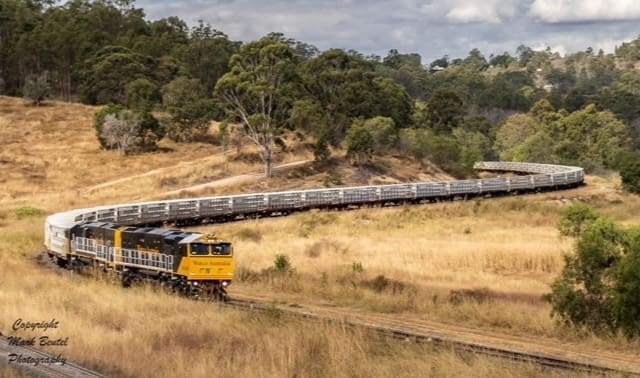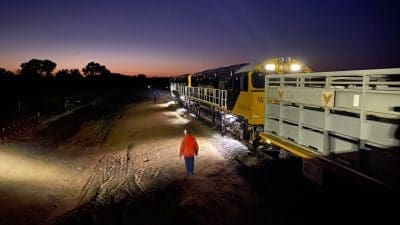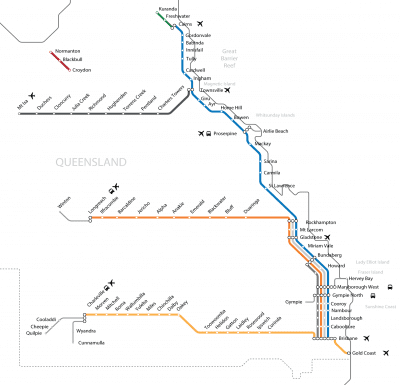
IN WHAT promises to be a new generation of cattle logistics in Queensland, rail freight service provider Watco East West has won a state government contract to operate on the state’s Central West rail line.
The new contract, won after a competitive bidding process, will see Watco East West managing their second service in Queensland, after securing the state’s South West rail line service early last year. That contact was renewed and extended in the current cycle.
The company will take over operations of the Central West service from current operator, Aurizon, in January. Service schedules will be determined in coming months.
Currently a weekly service is operated by Watco out of the Morven Rail Hub, with services also provided out of selling centres like Roma and Dalby to coastal meatworks. As herd recovery after drought continues, more services will be added, as required.
Watco East west is a joint venture between US transport giant Watco, and Australian logistics entrepreneur, Chris Hood.
The company’s Cattle Train division won the contract for Queensland’s southwestern line a year ago (see QR map), with ambitions to expand.
As the map here shows, Queensland is serviced by three east-west freight lines, running to Quilpie (southwest), Winton (Central west) and Mt Isa (northwest).
From January, Watco will manage both the southwest and Central west lines. The latest contract runs from 2022 to 2028, with a three-year additional option.
Queensland is unique among Australian states in maintaining a dedicated rail livestock freight network. The fact that the state houses close to half of Australia’s beef cattle population, widely geographically dispersed, is a driving factor.
An estimated 500,000 cattle per year used the state’s rail service in the distant past, when the service was operated by the Queensland Government itself. Veterans remember a cattle train once leaving Quilpie, in the state’s far southwest, every day, seven days a week, but numbers have waned in more recent times, for a wide variety of reasons.
Focus on innovation
Watco East West director Chris Hood said his business was keen to bring innovative thoughts to the cattle logistics table, and the extra freight contract would add to its ability to do this.
“We are determined to make this operation a success and ultimately deliver better outcomes for both processors and cattle producers by integrating the two services with road use,” he said.
“Ultimately, we will be concentrating on improved communications and better coordination between road and rail livestock transport.”
Watco East West is already managing the Morven Rail Freight Hub (see earlier report), operating services into Oakey and Brisbane. The significance of the rail hub facility would only grow with the addition of the central western line service.
“Our aim will be to attract cattle into loading points as far north as Winton and Clermont, as well as building greater volumes from the north to the west and into the Morven Freight Hub,” Mr Hood said.
He said is it was a well-known fact cattle travelled better on trains, and he looked forward to putting cattle on trains in areas where there were already pressure points on the state’s road networks.
“One train is equivalent to around fifteen B-doubles, and Australian logistics are changing constantly, so it is imperative we integrate rail and road usage strategically to getter better outcomes for users,” Mr Hood said.
“We have government infrastructure that is in fantastic condition across Queensland and it is not utilised to its potential.”
Potential for greater volume
Mr Hood was adamant that the long-criticised Queensland rail network was more than capable of handling a vast increase of volume, if run properly.
“We have this vital infrastructure that in many places is sitting idle, and Watco East West is excited to be reinvigorating its usage to support Queensland’s beef industry,” he said.
 Mr Hood sees future potential in movement of store and feeder cattle, as well as the company’s ‘bread and butter’ slaughter cattle.
Mr Hood sees future potential in movement of store and feeder cattle, as well as the company’s ‘bread and butter’ slaughter cattle.
The contracts were important for regional communities, and actively supported the Queensland beef industry.
Mr Hood thanked the Queensland Government, singling-out ministers Mark Bailey and Mark Furner, for listening to regional communities about what they wanted to see improved in cattle freight service delivery.
“The communities where we will be operating will benefit from this government decision, and we will work collaboratively with the cattle industry and the road freight industry to ensure system coordination,” he said.
Current service provider Aurizon has attracted criticism in the past for its heavy focus on servicing the coal and minerals bulk freight sector, at the expense of livestock clients.
Supporting communities and cattle transport
Transport and Main Roads minister Mark Bailey said the Central West line contract would support cattle transport by rail from central-west and south-west parts of the state.
“Supporting cattle producers and Queensland’s beef industry is an integral part of our COVID economic recovery plan,” Mr Bailey said.
“Transporting cattle on rail reduces wear-and-tear on our roads and reduces traffic congestion, so a key aim of this contract is to increase the amount of cattle transported by rail services,” he said.
“Queensland has the largest and some of the best beef herds in Australia, and the beef industry is a significant contributor to the state’s economy. It’s why the government invested $5 million to repair the disused Yeppoon branch line, so cattle trains could travel directly into Rockhampton’s JBS abattoir.”
“More than 10,000 Queenslanders work in the beef industry, and cattle transport is a critical part of its successful operation in a state as large as ours,” Mr Bailey said.
“By supporting businesses like Watco to help manage the freight task, we’re sharing the load between road and rail.”
Agriculture minister Mark Furner said the new contract would help to ensure efficient logistical arrangements to support the cattle supply chain.
“Partnerships like this one are a key strategic strength of the agricultural industry in Queensland, supporting thousands of jobs and billions of dollars in exports,” Mr Furner said.
Watco East West director Chris Hood said his company was excited to be part of reinvigorating the transport of cattle on rail in the state’s South West and Central West regions through delivering regular, reliable and responsive rail freight services.
“Focussing on our Customer First Foundation Principles, we look forward to working with the industry supply chain and meeting the needs of all stakeholders involved and actively growing the number of cattle trains in the region,” Mr Hood said.
The tender process for cattle rail services on the state’s North West line was ongoing, the government said.

